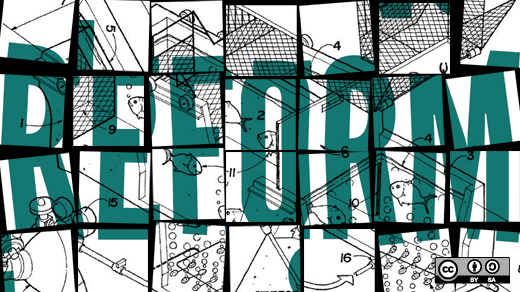Many Christians refuse to commemorate Reformation Day–which is today–because they think it is wrong to celebrate the break-up of the church. But the concept of “reformation” does not entail starting up something new from scratch. Rather, it means fixing what is broken.
Back in 1517 the church was in need of reformation, as even Roman Catholics came to admit. The break-up came only when the Pope refused to reform the church and instead excommunicated the reformers. Technically, there is still only one church–which exists in innumerable congregations, denominations, and affiliations–the Body of Christ consisting of all the faithful. But the tangible, visible manifestations of that spiritual reality are extremely important in building up that Body of Christ. A day to reflect on “reformation” can remind Christians of their responsibility to continually be fixing what is broken in their churches.
Is there any doubt that today’s institutional church has much that is broken and is thus in sore need of reformation?
Sexual immorality–from harassment to child abuse–on the part of both Catholic priests and evangelical ministers is scandalizing even the non-Christian world. Churches’ preoccupation with politics, whether on the right or on the left, makes them seem indistinguishable from the world.
Church leadership is all awry. Devout Catholics normally the most loyal to the papacy find themselves in conflict with the Pope. Meanwhile, in Protestantism, celebrity preachers seem to be trying to turn themselves into mini-popes. There is widespread confusion about the pastoral office–who can be a pastor (women? gays? a self-ordained entrepreneur? a man called and ordained?) and what pastors are (the congregation’s employee? the C.E.O. of the congregation? a psychologist and social worker? the shepherd of Christ’s flock?).
Theological confusion reigns. Different conceptions of God are proclaimed, with His incarnation in Christ hardly mentioned. Faith is reduced to a work. The Bible is reduced to a rule book or a manual for successful living. Worship has become a mashup of a pop-music concert and a TED talk. The sacred has been swallowed up by the profane, even in church. Instead of denying ourselves, as Jesus commanded (Matt 16:24), we are taught to fulfill ourselves. Everyone basically makes up their own theology according to their preferences.
Maybe you disagree with some of these criticisms, but I suspect you have others. Don’t you have the sense that all is not well with today’s churches?
Could it be that the decline of Christian influence that we keep hearing about, the secularization of the culture, could have something to do with our increasingly secularized churches? That when the non-churched say they are “spiritual but not religious,” that they reject “institutional religion,” that might be evidence that today’s church needs reformation?
So how can the church be reformed today? Reformation does not mean simply changing things. Throwing out the old, making things up-to-date, building something completely different–such strategies, though seemingly the most obvious approaches, do not constitute reform. “Form” is a philosophical term meaning “the active, determining principle of a thing as distinguished from matter.” It is related to the essence of a thing, the source of its characteristic shape and being. To “re-form” means to return something to its original form, to restore its essence.
So what distinguishes Christianity from all other religions? What is the essence of Christianity? Not belief in God or the promotion of morality, since other religions have that. The “determining principle” of Christianity and thus the church would have to center on Christ, what He has done to save us, and His revelation in God’s Word.
Thus, reforming the church today would involve a heightened emphasis on the Gospel and the Word of God. That is, the same emphases as in the reformation of 1517.
The good news “that Christ Jesus came into the world to save sinners” (1 Tim 1:15)–is agreed to by all Christians. But that Gospel of Christ is currently obscured in today’s churches by other “gospels”: the social gospel of the left; the social gospel of the right; the prosperity gospel; the psychological gospel; the positive thinking gospel. Churches today teach faith, and they would agree in principle that we should put our faith in Christ. But they also often teach that we should have faith in ourselves. Today’s churches often hold to the Gospel of Christ with great zeal, but they relegate it to conversion alone–either their own, long ago, or in gaining other converts–but they have stopped applying it to all of life, thus losing the transformative power in the Christian life. Recovering and applying the centrality of the Gospel and all that it implies can reform not only doctrine and practice but morals, relationships, vocations, and the entirety of the Christian life, as faith becomes active in love.
Recovering the Gospel goes hand in hand with recovering the Word of God. Not just as a collection of information but as God’s revelation of Himself in human language, the very voice of God who addresses us personally in its pages, by which the Holy Spirit creates faith in Christ. Indeed, the Bible preserves the “living and active” Word (Heb 4:12) by which the entire universe was created, which gave everything its “form,” the Logos that gave us logic, and that is identical with Christ Himself (John 1). Many churches today believe in the Bible, including its inerrancy, but they nevertheless seem to miss its true scope and power, reducing it to a self-help manual, a collection of principles for successful living, or a puzzle to interpret. Mainline Protestants, though, have largely excised the Bible from their churches, employing “higher criticism” to free them from its authority. In doing so, they have hollowed out their teachings and made themselves all but irrelevant. Restoring the centrality of God’s Word and giving it free rein is what brings reformation, which always, ultimately, is God’s work.
Illustration by Libby Levi via Flickr, Creative Commons License














